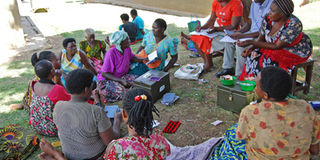Insurance scheme changes lives of Mbarara residents

Innovation. Members of Katojo Tweragurize Group during a recent meeting in Biharwe Division, Mbarara Municipality. PHOTO BY RAJAB MUKOMBOZI
What you need to know:
- Ms Katusiime says members have paid about Shs25 million under the scheme.
Mbarara. More than 300 families in Biharwe Division, Mbarara Municipality, can now conveniently access treatment for illnesses such as malaria, typhoid, brucellosis, cough, diarrhoea, worms and get ante-natal care courtesy of the community health insurance scheme.
Katojo Tweragurize Group, which started in 2013, is growing by leaps and bounds.
Ms Immaculate Katusiime, the group chairperson, says each member pays Shs5,000 every three months for their treatment and that of any of their family members.
When a member falls sick and is admitted to hospital, he or she just pays an additional Shs5,000. The rest of the treatment costs are catered for by the scheme. Those treated as outpatients pay top-up of Shs2,000.
The treatment is done at Katojo Community Health Centre III where Ms Katusiime is a health worker.
The scheme, however, does not cover complicated illnesses as stipulated in their memorandum of understanding.
“In 2013, I was part of the people who received training in Mbarara by USAID about health insurance. After training, I saw how my people were struggling to foot medical bills. Luckily, I was working at Katojo health facility, so I decided to mobilise members for this scheme,” says Ms Katusiime.
Ms Mary Muhangi, a resident, says she has been treated at the facility six times under the scheme.
“I have paid Shs30,000 in the scheme but I have been treated six times. Once I was admitted [to hospital] with acute malaria,” says Ms Muhangi.
Ms Clare Natukunda, a resident of Katojo, says they no longer have to sell off their property to pay medical bills.
Ms Natukunda says they are concentrating on development projects without worrying about the cost of treatment once they fall sick.
Testimony
“Medical treatment takes almost half of the family income and unlike feeding, school fees and clothing, you cannot plan for it. So, when it strikes, you are either forced to sell off some family property or go for a loan. But with this scheme, you cannot get worried of treatment costs,” she says.
Mr Ham Kabagambe, 75, says: “Because of my advanced age, I am frequently afflicted by illnesses. I do not think I would have managed treatment if it were not for this scheme.”
Ms Katusiime says members have paid about Shs25 million under the scheme. The health insurance has given birth to a saving scheme where members have collected Shs30 million. Every member saves Shs10,000 every week.
“Right now, we have about Shs20 million on the savings account and close to Shs10 million in loans to the members. This has economically empowered members; they can borrow money for agriculture, school fees at a very low interest rate unlike banks that charge high interest rates,” she says.
Ms Clemensia Nanyonjo, who represents the area in Mbarara Municipal Council, says the group is now a role model for social –economic transformation in the community.



